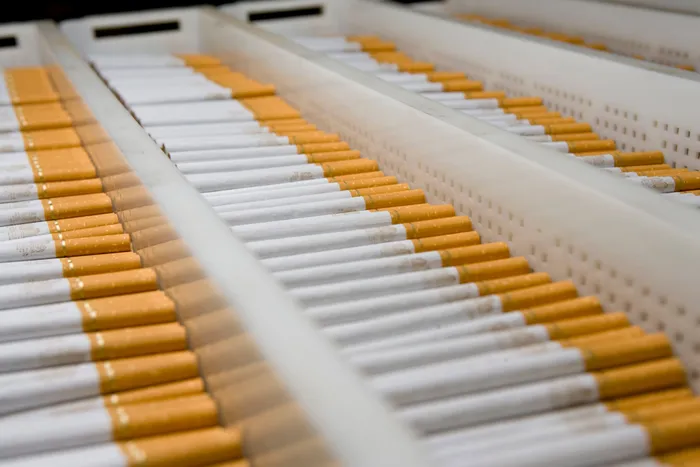Local manufacturers fuel illicit cigarette trade in South Africa, warns BAT
MANUFACTURING

As much as R28 billion in annual tax revenue was being lost to illicit trade, exceeding the South African Revenue Service’s (Sars) entire additional collection target of R20bn.
Image: Supplied
Tawanda Karombo
British American Tobacco South Africa (BATSA) has pointed the finger at local manufacturers for exacerbating the illicit trade in cigarettes.
Their claims come on the back of a study released by the company, shedding light on the alarming prevalence of illegal cigarette sales in the country.
This issue, which was once largely perceived as a cross-border problem, has now morphed into a serious domestic challenge that threatens the economy and public health.
Speaking after the release of a BATSA-commissioned study into the pricing of tobacco cigarettes in South Africa on Tuesday, Johny Moloto, the company’s head of corporate and regulatory affairs said illicit trade in cigarettes was now a domestic concern for the country.
“This is no longer just a cross-border issue. This is a homegrown crisis, fueled by local manufacturers who continue to operate with impunity while the state loses billions in revenue,” said Moloto.
Illicit trade in tobacco cigarettes is worsening in South Africa, with over 70% of retail outlets selling the products below the mandated minimum tax price.
Commissioned by British American Tobacco (BAT) and independently conducted by Ipsos, the 2025 report outlines alarming national trends in the illegal tobacco trade, identifying South African manufacturers as the primary culprits behind the growing black market.
Conducted by Ipsos, the Cigarette Retail & Wholesale Price Research report reveals that 76.7%, up from 27.4% in 2022, of South African retailers were now “selling cigarettes below the minimum” tax threshold.
As much as R28 billion in annual tax revenue was being lost to illicit trade, exceeding the South African Revenue Service’s (Sars) entire additional collection target of R20bn.
“Despite increased raids and product seizures over the past year, illicit cigarette availability has continued growing, indicating current strategies are ineffective. locally manufactured brands continue to dominate the market for products selling below Minimum Collectable Tax price,” noted the report.
According to the Customs and Excise Act, the Minimum Collectable Tax price for a box cigarettes in South Africa should sell for above R26.22 a pack after accounting for levies.
However, results from the survey show Gold Leaf Tobacco Company as having the highest prevalence of products purchased, accounting for 43% of total outlet sample universe.
Within the portfolio of the Gold Leaf Tobacco Company, 78% of products purchased retailed for R20.00 a pack and below whilst 89% of products purchased. BATSA had the second-highest prevalence of products purchased accounting for 13% of the total outlet sample.
“Within the BATSA portfolio of products purchased, 1.0% of portfolio products purchased retailed for R20.00 and below whilst 1.5% of the products purchased retailed for under the Minimum Collectable Tax of R26.22 and below,” notes the Ipsos report.
It added that Afroberg had the third highest prevalence of products purchased, accounting for 8% of the total outlet sample.
Within the Afroberg portfolio of the product purchased, 92% of portfolio products purchased retailed for R20.00 and below, whilst 96% of products purchased retailed for under the Minimum Collectable Tax of R26.22 and below.
The study disclosed that “the most common retail price was R10, found in nearly 1 in 5” transactions. It further noted that of the 23 manufacturers identified in the illicit chain, 14 were based in South Africa, accounting for 91% of the illicit stock.
Francois van der Merwe, representing the South Africa Tobacco Transformation Alliance, said the growing prevalence of illicit trade in South Africa created a “grossly uneven playing field” where legal manufacturers face escalating costs and taxes, while illicit operators evade them entirely.
Moloto criticised Sars and law enforcement for failing to act on consistently published, actionable intelligence.
“We have repeatedly shown who the culprits are. If Sars and the police wanted to act, they could—today,” he said.
Players in the tobacco industry in SA have now proposed for the deployment of Sars officers at manufacturing plants, enforcement of licensing conditions by revoking licenses of non-compliant manufacturers and the introduction of a minimum retail price to simplify enforcement and enable police to act on the spot without needing complex tax calculations.
BUSINESS REPORT